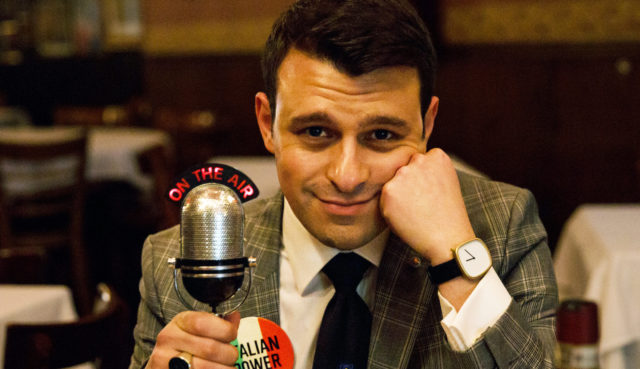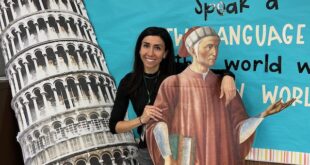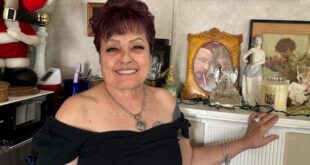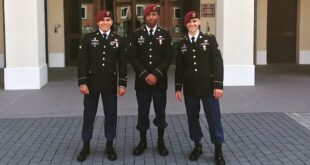Through “The Italian American Experience,” John Viola shines a light on all that makes our heritage great.
While our immigrant forebears sat by giant radio consoles to absorb the news, music and culture of Italy, today’s Italian Americans have podcasts and, among them, one has remarkable traction. How much? Try roughly 20,000 listens per episode. Not bad for a program that’s less than four years old and the product of programmers learning the ropes as they go.
The driving force behind “The Italian American Experience” (italianamericanexperience.com) and its every-other-week companion, “The Italian American Power Hour,” is John Viola. If that name sounds familiar, it’s no wonder: Viola served as president and chief operating officer of the National Italian American Foundation for close to five years. Now he’s taking to a role that naturally extends his lifelong passion for all things Italian: a highly visible man building community in audible, laudable ways.
Lou&A spoke with Viola to find out what Italian pride means to him and how he has embraced podcasting as a way to rally other Italian Americans to preserve and promote culture for future generations.
Lou&A: Tell us about your Italian roots.
John Viola: I’m Italian on both sides; my father’s parents came from southern Campania and my grandfather’s father came from Basilicata. My mom’s father is from Palermo and her mother is from Bari. I’ve always harkened back to the roots in Southern Italy — it’s very important to me.
Lou&A: You grew up in Brooklyn, but your family moved to Chatham, New Jersey, which is very Irish. How did this affect your ethnic identity?
Viola: Leaving a very Italian neighborhood for a place where we were isolated probably made my ethnicity more central to who I am. It was that otherness — the secret sauce — where I knew I had something unique in my giant, extended family. We all moved out together from a tenement house to a 10-block radius. My parents were building their businesses and knew no fear of failure. You always knew you had the family and the kitchen. Everything else was gravy. (Laughs)
Lou&A: So how did the Italian American Podcast get its start?
Viola: It’s interesting the way it came about. The original podcast started in 2015. I was at the National Italian American Foundation when I was approached by Dolores Alfieri and Anthony Fasano. They’d started an Italian-American podcast, and I really liked their whole vision and project. I was honest in telling them that NIAF didn’t have the funds, but I said, “I want to support you personally, help you book talent, and maybe advertise on the show.” Well, the show really took off and their professional lives started to take off, too. Dolores became Gov. Andrew Cuomo’s director of Italian American Affairs for New York State.
As they found it more difficult to keep up, we decided to keep it going with Patrick O’Boyle — my best friend, whose mother is Neapolitan. Just over a year ago we created the Italian American Power Hour, which airs every other week, and Rosella Rago from “Cooking With Nonna” joined us as another co-host. The audience has exploded — we’re getting close to 20,000 listens per episode — and this has become more a vocation than a hobby. I’m so passionate about it.
Lou&A: What was your experience like at NIAF? When you left in January 2018 you were president and COO.
Viola: I’d been a member since I was a teenager. I found the NIAF Gala through a friend of the family, I joined the youth council, and my family got involved. It was a dream job to work for a community I love so, so much. It’s a strong, self-identified community; two censuses ago, it was 18 million people, and the last one it was 18.2, so it’s not going away. But in terms of membership and participation, it’s very different and sometimes these institutions have a difficult time, especially across generations.
I was full-time in Washington D.C., driving back to New York City to be with my wife on the weekends for Sunday pasta. [Laughs.] So after I left NIAF, I took a long overdue role at the family office — working with real estate, investment, sports and entertainment. But this podcast has become such a passion of mine, I’m working on that full time.
Lou&A: You’ve used the word “passion” twice in relationship to the podcast. What’s behind your dedication and love?
Viola: There are so many great stories out there, people in the community who have done so much. And with a podcast, the barriers of entry aren’t there. You can begin reaching people right away.
Lou&A: Then there’s the food tradition.
Viola: People who’ve listened say, “We love that you’re sitting around a table, drinking wine and cracking walnuts.” We did two episodes where we cooked and ate a Christmas Eve feast. My grandfather died when I was 16, so for the past 18 or 19 years I’ve been cooking for the whole family. They used to prepare Christmas eel and my grandmother still made it even after [my grandfather] was gone — it was almost a good luck token. So I told myself, “I can keep this on the table every year for my younger cousins who weren’t around when my grandmother prepared it.” Starting a couple of years ago, we had to buy two eels because we were running out.
Lou&A: What’s been the most satisfying part of producing this podcast?
Viola: In my mind, I’m a professional Italian American. [Laughs.] I’m a member of every group and lodge president of a new chapter of the Italian Sons and Daughters of America, based in New York City. So it’s gratifying to see the interaction with the audience as we try to evangelize for our culture.
Lou&A: And in supporting the arts, you’ve been vocal — in more ways than one.
Viola: Over the years Lena Prima (daughter of Louis Prima) and I became really, really close friends. She would sing at the NIAF Gala weekends and was always a big hit. So we started a conversation about her dream project; she’s a great talent and community advocate, and I wanted to spotlight her. I served as executive producer on her album “Prima La Famiglia.” (Reviewed in the March issue of Fra Noi).
Well, she needed a duet partner for the song, “See That You’re Born an Italian.” Joe Piscopo was going to do it but was stuck in New Jersey. So she said to me, “Why don’t you lay down a scratch vocal and we’ll keep it there until we get the actual vocalist?” And she tricked me. She liked the vocal so much that I have an uncredited duet on the record.
Lou&A: At the end of the day, why are you so proud to be an Italian American?
Viola: Our identity is the last great lifeboat for our culture when the rest of the world is saying, “You don’t need your culture.” This is a world where it’s increasingly difficult to find authenticity. I’m doubling down on it, I guess.
The above appears in the May 2019 issue of the print version of Fra Noi. Our gorgeous, monthly magazine contains a veritable feast of news and views, profiles and features, entertainment and culture. To subscribe, click here.
 Fra Noi Embrace Your Inner Italian
Fra Noi Embrace Your Inner Italian







